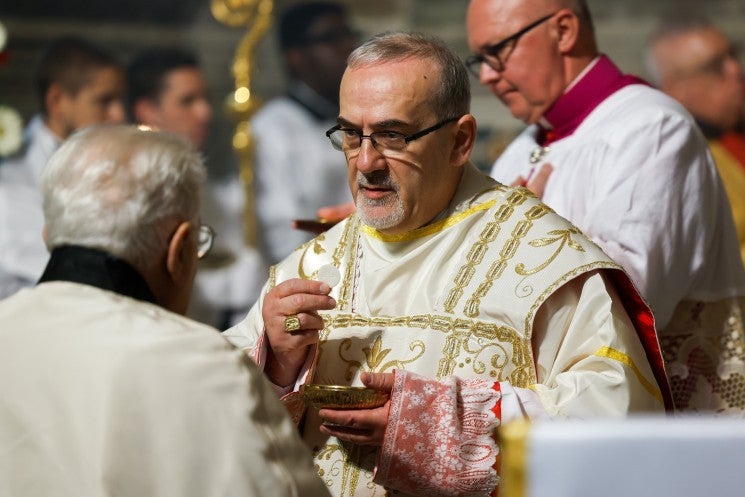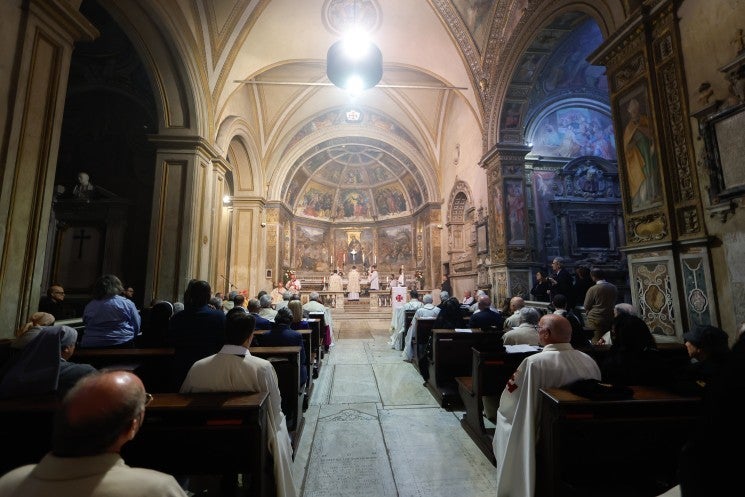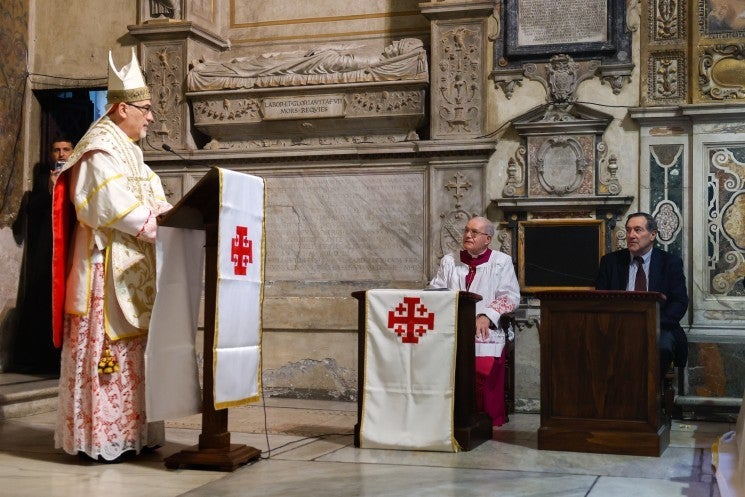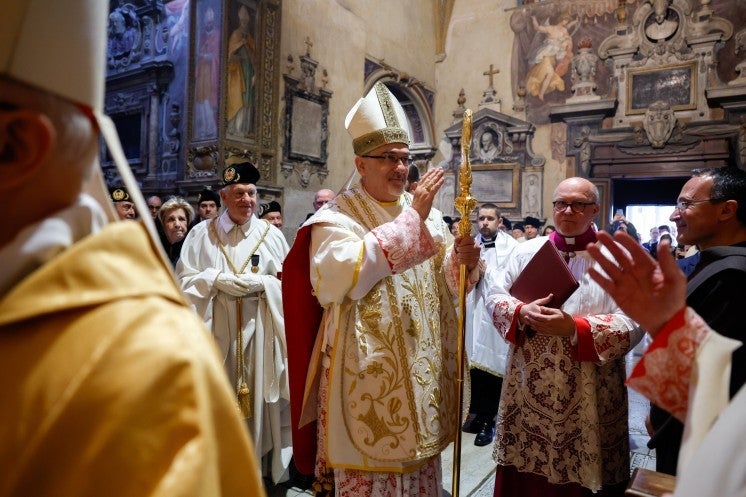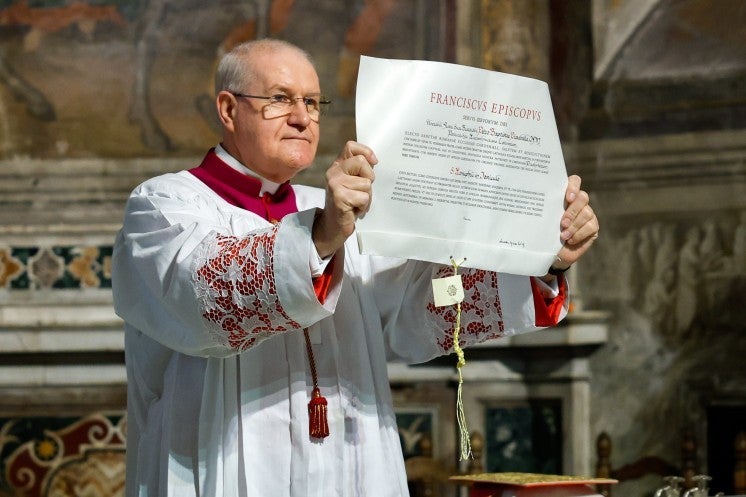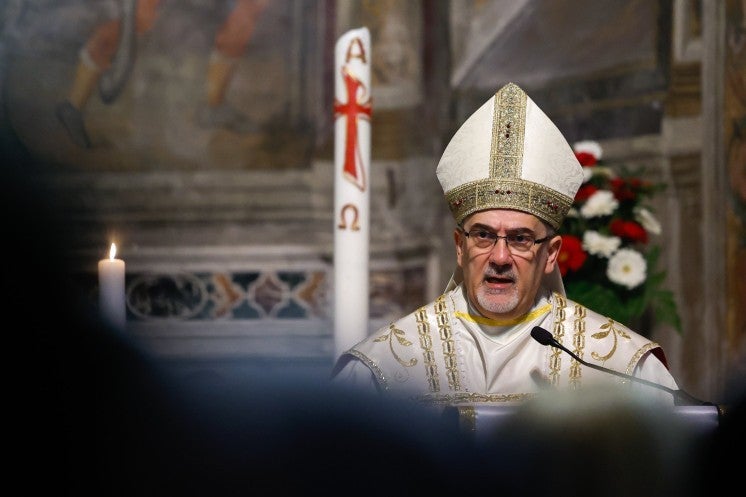Browsing News Entries
National Day of Prayer and Remembrance for Mariners and People of the Sea to Include Special Prayer for Those Impacted by Baltimore Key Bridge Tragedy
Posted on 05/1/2024 08:30 AM (USCCB News Releases)
WASHINGTON – Each year, National Maritime Day (May 22) recognizes the men and women who work or travel on the high seas. It is on this day the Catholic Church observes the National Day of Prayer and Remembrance for Mariners and People of the Sea and highlights the ministry of Stella Maris (Star of the Sea), the apostolate of the Catholic Church for the people of the sea. Bishop Brendan J. Cahill of Victoria in Texas, the bishop-promoter of Stella Maris in the United States, invites the faithful to support, remember, and pray for the many men and women who earn their livelihood through work on the seas, including merchant mariners, seafarers, fishermen, port personnel, and those in the maritime industry.
This year, Bishop Cahill is calling for special prayers of remembrance for those affected by the March 26 tragedy of the Francis Scott Key Bridge collapse in Baltimore. A Mass for the Day of Prayer and Remembrance for Mariners and People of the Sea will be offered on Saturday, May 18 at the Basilica of the National Shrine of the Immaculate Conception in Washington, D.C. at 12:10 p.m. In the immediate wake of the cargo ship accident and bridge collapse, the Stella Maris network of port chaplains and partners mobilized to provide pastoral care and support for the crew members of the cargo ship Dali that made impact with the bridge and for crew members of other vessels in the Port of Baltimore.
“Each year, we pray for those who work on the high seas and the ports. In a special way this year, we remember those who have been impacted by the collapse of the Key Bridge, particularly the six construction workers who perished in the bridge collapse, and for their families as they mourn the loss of their loved ones,” said Bishop Cahill. “And we also pray for the captain and crew of the cargo ship, and the countless people who have been working in the aftermath of the tragedy, including the U.S. Coast Guard, Army Corps of Engineers, dive teams, first responders, construction workers, law enforcement, and government officials. Still impacted are also the thousands of dockworkers and those who rely for work in the Port of Baltimore. Worldwide, there are countless men and women who labor on the high seas for their livelihood -- let us seek the intercession of Our Lady, Star of the Sea, that she protect and guide us,” he continued.
For more information on the annual Mass, please visit: https://www.nationalshrine.org/event/annual-maritime-day-mass-2024, and for more information on the ministry of Stella Maris, please visit: https://www.usccb.org/stellamaris.
###
Cardinal says church shouldn't expect 'miracle' of peace in Holy Land
Posted on 05/1/2024 08:30 AM (USCCB News Releases)
ROME (CNS) -- Sudden peace negotiations or an intervention by the United States will not deliver Israelis and Palestinians from the suffering caused by the war in Gaza, a Jerusalem-based cardinal said.
As a result of the war, the rift between Israelis and Palestinians is "deeper than it has ever been," Cardinal Pierbattista Pizzaballa, patriarch of Jerusalem, said May 1.
"We are all waiting for something big, something that changes the course of the history of events," he said in his homily during a Mass to formally take possession of his titular church in Rome. "We all want the United States to resolve the problem; we all want the peace negotiations to end in something big, important, in a way that marks the course of history."
But "this is not the way the kingdom of God grows," he said. "The kingdom of God grows in community, with communal gestures, calmly, little by little."
The kingdom of God is not "a miracle that is performed, suddenly changing the fate of the world," the cardinal said, rather it is "a seed sown in the ground that dies and little by little grows and bears fruit." The Catholic Church, he added, is called to be that slowly but steadily growing seed.
Cardinal Pizzaballa preached before a packed congregation in the small, historic Church of St. Onuphrius on the Janiculum Hill in Rome as he formally took possession of the church, a tradition meant to seal his identity as a member of the clergy of Rome. In ancient times, the cardinals who elected popes were pastors of the city's parishes.
Knights and dames of the Equestrian Order of the Holy Sepulchre of Jerusalem, dressed in their ceremonial capes, joined the cardinal for the celebration. The ancient Catholic chivalric order supports the Latin Patriarchate of Jerusalem with prayers, financial assistance and regular pilgrimages. Cardinal Fernando Filoni, grand master of the order, participated in the Mass as did Cardinal Leonardo Sandri, vice dean of the College of Cardinals.
The congregation at the Mass also included Franciscan friars, the order to which Cardinal Pizzaballa belongs. The Church of St. Onuphrius, established in 1439, has been under the care of Franciscan Friars of the Atonement, a religious congregation founded in the United States, since 1946.
Joe Donnelly, U.S. ambassador to the Holy See, was also present for the Mass.
After the Mass, Cardinal Pizzaballa told reporters that he struggles to understand the protests taking place across college campuses in the United States over academic institutions' investments in companies that do business with Israel.
"Universities are places where cultural debate, even when heated, even when tough, should be available at 360 degrees," he said. "The contrast of completely different ideas, harsh as they may be, must be expressed not through violence or boycotting, but by knowing how to confront one another."
"The world is made of different opinions that must be confronted, not by explosions but by discussions," he said.
The Mass began with the reading of the formal declaration from Pope Francis assigning the church to Cardinal Pizzaballa when he was made a cardinal Sept. 30, 2023.
"It's stupendous that the pope thought that the patriarch of Jerusalem should be a cardinal," said Cardinal Filoni while greeting Cardinal Pizzaballa on behalf of the Order of the Holy Sepulchre at the close of Mass. "Today it unites Jerusalem, the Holy Land and the patriarchate which you represent, with the church of Rome."
Pope Francis Accepts Resignation of Archbishop Leonard Blair of Hartford; Succeeded by Coadjutor Archbishop Christopher Coyne
Posted on 05/1/2024 08:30 AM (USCCB News Releases)
WASHINGTON - Pope Francis has accepted the resignation of Archbishop Leonard P. Blair, 75, from the Office of Archbishop of Hartford. Archbishop Christopher J. Coyne, up until now coadjutor archbishop of the same diocese, will succeed him as archbishop of Hartford.
The resignation and appointment were publicized in Washington, D.C. on May 1, 2024, by Cardinal Christophe Pierre, apostolic nuncio to the United States.
Archbishop Coyne’s biography may be found here.
The Archdiocese of Hartford is comprised of 2,288 square miles in the State of Connecticut and has a total population of 1,949,519 of which 543,341, are Catholic.
###
Cardinal Parolin visits Brazil, discusses indigenous peoples, peace (L'Osservatore Romano (Italian))
Posted on 05/1/2024 06:05 AM (CatholicCulture.org - Catholic World News)
The president “praised Pope Francis’ role as one of the world’s great leaders to stand up against war and inequality,” according to the president’s office, as he and Cardinal Parolin discussed “the need to overcome inequalities, the importance of religious freedom, and the Brazilian government’s efforts on behalf of indigenous peoples.”
Cardinal Parolin also spoke about the importance of prayer for peace as he visited the Basilica of Our Lady of Aparecida.
Brazil has more Catholics than any other nation. Cardinal Parolin’s visit had added significance because he led a two-day retreat for the nation’s bishops, allowing the cardinals there to become better acquainted with the papabile Secretary of State.
Pope Francis, at general audience, reflects on virtue of faith (CWN)
Posted on 05/1/2024 06:05 AM (CatholicCulture.org - Catholic World News)
At his May 1 general audience, held in Paul VI Audience Hall, Pope Francis reflected on the theological virtue of faith, in the latest talk in a series of Wednesday general audiences devoted to the virtues and vices.
Leading Vatican diplomat criticizes push for abortion (Holy See Mission)
Posted on 05/1/2024 06:05 AM (CatholicCulture.org - Catholic World News)
At the Cairo conference, the Holy See worked with many Muslim nations to head off attempts to declare an international right to abortion.
The push for abortion “is not just a harmful misunderstanding” of the Cairo conference’s program of action, “but of development in a wider sense,” Archbishop Caccia said in an April 29 statement. “It also leads to the erosion of respect for the sanctity of human life and the inalienable dignity of the human person.”
AP sees 'an immense shift toward the old ways' in Church in the US (AP)
Posted on 05/1/2024 05:05 AM (CatholicCulture.org - Catholic World News)
“I don’t want my daughter to be Catholic, not if this is the Roman Catholic Church that is coming.” said one woman in a Wisconsin parish, after “contemporary hymns were replaced by music rooted in medieval Europe.” (The AP reporter was presumably referring to Gregorian chant, which the Second Vatican Council decreed “should be given pride of place in liturgical services.”)
'Please, brothers, stay here,' Franciscan minister general tells friars of the Holy Land (Christian Media Center)
Posted on 05/1/2024 05:05 AM (CatholicCulture.org - Catholic World News)
St. Francis of Assisi founded the Franciscan province there in 1217, and the Holy Land’s principal shrines are entrusted to the care of the Franciscan friars.
“I found the brothers better than I thought: hurt by what is happening, but also determined to stay here,” said Father Fusarelli. “So the first word is please, brothers, stay here.”
“Stay not locked in, but stay with the people, next to the people, as you can,” he continued. “Remain as intercessors, from the Latin intercedere, to walk between God and people, in the midst of the battlefield. We are in a battlefield.”
South African priest is gunshot victim (Vatican News)
Posted on 05/1/2024 04:05 AM (CatholicCulture.org - Catholic World News)
Father Paul Tatu Mothobi was a former public-relations official for the South African bishops’ conference. His body was found in his car on a roadside, riddled with gunshot wounds.
Noting the shooting death of another priest, Father William Banda, in March, the South African bishops’ conference said that the latest killing “is not an isolated incident but rather a distressing example of the deteriorating state of security and morality in South Africa.”
'The saved and the drowned': Vatican newspaper laments migrant boat disaster (L'Osservatore Romano (Italian))
Posted on 05/1/2024 04:05 AM (CatholicCulture.org - Catholic World News)
“They remained at the mercy of the Atlantic Ocean for two days, their hands desperately clinging to the wreck of their boat, their mouths parched with thirst, their eyes wide with fear,” the unsigned article began. “Two days, 48 hours, 3,000 minutes of suffering for nine migrants, the only survivors of the shipwreck of their boat which occurred yesterday off the coast of the Canary Islands.”
